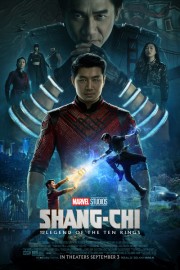Shang-Chi and the Legend of the Ten Rings
Is it possible for Marvel to adhere to its formula while also giving us something fresh? It depends on what you are referring to when it comes to defining “fresh.” “Shang-Chi and the Legend of the Ten Rings” has a lot of things in common with the Marvel formula- main character with daddy issues, unresolved familial drama, necessary build-up to future films, needlessly big action climax- but how the film deals with a lot of these things make it feel like something entirely unique in the MCU.
The first thing I’d like to discuss is an action set piece about 20 minutes into the film. Our main character, Shang-Chi (Simu Liu), is in a cage match with an opponent. In this sort of hand-to-hand combat, we’ve come to expect an aesthetic to the action that is all about accentuating the brutality through tense close-ups and kinetic editing. What we get from director Destin Daniel Cretton and cinematographer William Pope (better known as Bill Pope) allows us different camera angles and perspective, and a clean visual palette that helps us feel as though we can follow the action. Compare that to what we got in a similar fight scene in “Snake Eyes,” which was a headache-inducing eyesore. Cretton and Pope keep that going for a good portion of the film.
The story begins 1000 years ago, and Wenwu (Tony Chiu-Wai Leung) has become the controller of the Ten Rings, mystical weapons that allow him to conquer armies and build an empire to last generations. One day, he goes to the mythic city of To La, which is in a forest that is determined to keep its secret. There he finds Jiang Li (Fala Chen), whom fends him off from taking the city. They also fall in love, and have two children- Shang-Chi and Xialing (played as an adult by Meng’er Zhang). After a family tragedy, Wenwu recommits to his army of warriors, leaving Shang-Chi and Xialing adrift, until they are adults, and the family needs to come together.
“Shang-Chi” is drawing on a lot of action inspirations for its set pieces. We get massive battles a la “Ran” and “Seven Samurai,” lyrical fight choreography in the vein of “Crouching Tiger, Hidden Dragon,” a runaway bus scene that reminds you of “Speed,” with some Jackie Chan street fighting going on at the same time, and that’s all just in the first half an hour. I’m not saying that “Shang-Chi” pulls any of these off as well as those inspirations, but in doing its own spin on these, “Shang-Chi” automatically distinguishes itself from other entries in the MCU, which is a welcome sight indeed. Cretton bringing Pope, one of the best cinematographers around (who worked on “The Matrix,” Raimi’s “Spider-Man 2” and “Scott Pilgrim vs. the World”), was an inspired choice, and they deliver great variety, visual creativity and effectiveness in much of the action. If I have one quibble, it’s not only that the climax feels as generic a climax as the MCU has given us, it’s that it visually looks like a completely different movie at a certain point. Otherwise, this was a feast of action and visual literacy.
At this point, almost 90% of the Marvel Cinematic Universe on the movie side has involved family turmoil and heroes with daddy issues to resolve- God bless Captains America and Marvel for being seemingly well-adjusted in that department- and with the plot description above, its no surprise that “Shang-Chi” offers up a lot of the same. Part of what distinguishes it, however, it that we not only get a father figure with layers (largely thanks to a performance by living legend Leung), but a film that hinges on ideas of nature vs. nurture, the ways we can stray in the face of grief and how children need something to balance themselves. We are not breaking new ground here, but all of this makes “Shang-Chi” feel novel and new in a franchise that just keeps hitting the same beats over and over again.
The MVPs of the cast are, not surprisingly, the best actors of the bunch in Leung and Michelle Yeoh and Ying Nan, but the rest of the cast acquits themselves well. As the title character, it takes a while for Liu to show himself adept as a leading actor in this type of movie, but when he gets pushed with the other actors in the film, he starts to shine. Shang-Chi’s best friend in the movie is Katy, and she is played by Awkwafina in a performance that borders on grating at times, but as the story moves forward, she begins to ground the character, and show a lot of what made her so wonderful in “The Farewell.” Zhang is very good as Xialing, and seeing her and Shang-Chi together give us a good connection with the characters. And yes, you’ll see a few different MCU cameos in the film.
Now that we are away from the Infinity Saga, and starting to further explore different sides of the Marvel Cinematic Universe, “Shang-Chi and the Legend of the Ten Rings” makes for a welcome change-of-pace, in not just what we’re seeing but how they’re bringing it to life. It doesn’t entirely work, but I look forward to seeing how this story reverberates in the years to come.










